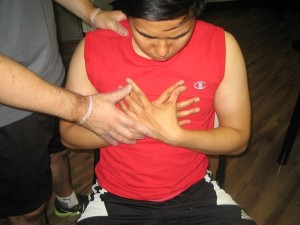A is a condition in which excessive blood and fluid loss makes the heart incapable of pumping sufficient blood to the vital organs of the body.
Causes of hypovolemic shock
When your body loses 1/5 of the blood present in your body, it goes into a hypovolemic shock.
Some of the most common causes of excessive blood loss include:
- External bleeding due to injuries such as cuts and punctures
- Internal bleeding
The amount of blood does not only drop due to bleeding, excessive fluid loss from the following causes may also lead to shock:
- Diarrhea
- Burns
- Vomiting
- Excessive sweating
Symptoms
- Cool, clammy, pale skin
- Sweating
- Rapid breathing
- Anxiety
- Weakness
- Confusion
- Little or no urination
- Unconsciousness
The severity of the shock depends on the amount of blood being lost from the body.
Diagnosis
Signs of shock indicated by diagnostic tests include:
- Low body temperature
- Low blood pressure
- Rapid yet weak pulse
Treatment

Individuals that have taken workplace approved first aid training will know how to provide basic care. This portion of the page will describe the steps taught to candidates enrolled in standard and emergency first aid programs.
If you see a person going through a shock, call an ambulance immediately. While you wait, follow these steps:
- Make sure the casualty is comfortable. Cover him with a blanket so that he is warm—to prevent hypothermia.
- Lay the person on the ground and elevate his feet above heart level to encourage circulation. Take caution while treating a person with a head, back or neck injury—do not move the person if he has gone through any of these injuries unless it is for his own safety.
- Do not give anything to drink or eat.
- If shock occurs due to an allergic reaction, remove the trigger and treat the specific allergic reactions, if you are trained to do so.
Once the casualty is hospitalized, he will be treated by replacing his body fluids through an intravenous line. Medication such as dopamine or epinephrine will be given to encourage blood pressure.
Even though hypovolemic shock is an emergency situation, symptoms and severe effects depend on the following factors:
- The amount of blood being lost from the body
- The rate at which blood or fluids are lost from the body
- The underlying cause—injury or illness—causing the loss of blood/fluid from the body
- Medication being taken for any chronic illnesses such as kidney, lung or heart disease and diabetes.
Casualties undergoing milder cases of shock recover much quickly than people who suffer severe cases of shock. In some cases, death may also result.
Complications
The following are the complications that may result from shock:
- Brain damage
- Kidney damage
- Heart attack
- Gangrene of the legs or arms
- Death, in extreme cases
